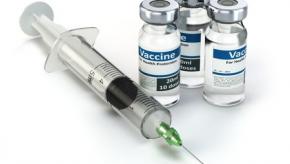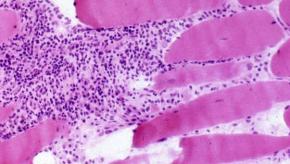All News
Anti-IL-23 Beats IL-17 in Plaque Psoriasis
Lancet reports a head-to-head trial of antibodies against interleukin (IL)-23 and IL-17A in patients with moderate-to-severe psoriasis favored guselkumab with superior PASI 90 responses at week 48 (compared to secukinumab).
Read ArticleNintedanib FDA Approved for Scleroderma Lung Disease
Last Friday, the US Food and Drug Administration approved Ofev (nintedanib) to slow the rate of decline in pulmonary function in adults with interstitial lung disease associated with systemic sclerosis or scleroderma, called SSc-ILD.
ILD as a complication of SSc may lead to progressive loss of lung function and may be associated with a significant mortality risk. Prior to the approval of Olev, there were no FDA approved drugs for SSc-ILD.
RA Women are Less Likely to Breastfeed
A large pregnancy registry has published their results showing rheumatoid arthritis (RA) patients who become pregnant are less likely to breastfeed compared to non-RA women from the general population, with many women stopping breastfeeding so that they could start medication, even though many of
Read ArticleRheumNow Podcast – Do’s and Don’ts in Spondylitis (9.5.19)
Dr. Jack Cush reviews the news and important research published in the last two weeks on RheumNow.com.
Read ArticleModifiable Risk Factors for Hyperuricemia
Choi and colleagues have shown that four modifiable risk factors (BMI, the DASH diet, alcohol use, and diuretic use) could individually account for a notable proportion of observed hyperuricemia.
Read ArticleRespiratory Risks Not Increased in RA Patients with COPD
An insurance claims based study of RA patients with COPD shows that biologics do not have an increased rate of respiratory events compared to those on conventional DMARDs.
A real world cohort of RA patients with COPD was drawn from US-based MarketScan databases. Patients on biologic DMARDs and/or targeted synthetic DMARDs (tsDMARDs) were propensity matched to those on conventional synthetic DMARDs (csDMARDs).
Weight Loss Cuts Hospital Stays for Obese TKA Patients
Morbidly obese patients who lost 20 lbs before total knee arthroplasty (TKA) cut their hospital stays by about 1 day, and were 76% less likely to have an extended hospital stay, research showed.
Read ArticleInfluenza Vaccination Update
FDA's Vaccines and Related Biological Products Advisory Committee met in Silver Spring, Maryland, on March 6 and 22, 2019, to select the influenza viruses for the composition of the influenza vaccine for the 2019-2020 U.S. influenza season.
Read ArticleTocilizumab Shows No Increase in Cardiovascular Risk
The ENTRACTE trial examined the risk for major adverse cardiovascular events (MACE) in RA patients and found no increased risk of MACE in patients treated with tocilizumab (TCZ) versus etanercept (ETN).
Read ArticleNumber of Prior DMARDs Portends Poorer Outcomes
Detailed analysis of two clinical trials in RA has shown that clinical responses decrease as the disease duration and number of prior DMARDs increase.
The associations between disease duration and number of prior DMARDs and response to therapy were assessed using data from two randomised controlled trials in patients with established RA (mean duration, 11 years) receiving adalimumab+methotrexate.
RheumNow Podcast - I Wanna New Drug (8-30-19)
Dr. Jack Cush vents on choosing new therapies in rheumatoid arthritis.
Read Article
High-Dose Vitamin D: No Help for Bone Health
Vitamin D might not be much help for strengthening bones among healthy adults without osteoporosis, Canadian researchers reported, even at doses far higher than recommended daily allowances.
In a clinical trial assessing three levels of daily vitamin D supplementation -- 400 IU, 4,000 IU, and 10,000 IU -- radial volumetric bone mineral density was significantly lower among those (ages 55-70) taking higher doses for 3 years, according to Steven Boyd, PhD, of the University of Calgary in Canada, and colleagues.
Checkpoint Inhibitors: Who Gets Myocarditis?
The usual risk factors for myocarditis may not apply to who gets it while on immune checkpoint inhibiting cancer drugs, an FDA adverse event database suggested.
Read ArticleTaltz FDA Approved for Ankylosing Spondylitis (Radiographic Axial SpA)
The FDA has approved the IL-17A inhibitor Taltz (ixekizumab) for the treatment of adults with active ankylosing spondylitis (AS: also known as radiographic axial spondyloarthritis).
Read ArticleACR/SPARTAN Recommendations for the Treatment of Ankylosing Spondylitis and Nonradiographic Axial Spondyloarthritis
The American College of Rheumatology (ACR), in partnership with the Spondylitis Association of America (SAA) and the Spondyloarthritis Research and Treatment Network (SPARTAN), released the 2019 Update of the Recommendations for the Treatment of Ankylosing Spondylitis (AS) and Nonradiographic Axi
Read Article
FDA grants breakthrough status to OFEV (nintedanib) forthe treatment of chronic fibrosing interstitial lung diseases (ILDs), other than idiopathic pulmonary fibrosis (which it is currently approved for). Nintedanib has been studied in PSS ILD. https://t.co/K0ZTyqrfh6
Links:
Dr. John Cush RheumNow ( View Tweet)

Dr. John Cush RheumNow ( View Tweet)

Dr. John Cush RheumNow ( View Tweet)

Dr. John Cush RheumNow ( View Tweet)

ATAP ATAPAdvocates ( View Tweet)

















